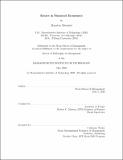Essays in financial economics
Author(s)
Meeuwis, Maarten.
Download1191222242-MIT.pdf (2.647Mb)
Other Contributors
Sloan School of Management.
Advisor
Jonathan A. Parker.
Terms of use
Metadata
Show full item recordAbstract
This dissertation consists of three essays in financial economics, with a focus on household financial decisions and their implications for asset pricing and macroeconomic dynamics. In Chapter 1, I use data on the portfolio holdings and income of millions of US retirement investors to show that positive and persistent shocks to income lead to a significant increase in the equity share of investor portfolios, while increases in financial wealth due to realized returns lead to a small decline in the equity share. In a standard homothetic life-cycle model with human capital and constant risk aversion, the portfolio responses to these two wealth shocks should be of equal magnitude and opposite sign. The positive net effect in the data is evidence for risk aversion that decreases in total wealth. In Chapter 2, I show that decreasing relative risk aversion preferences have significant long-run implications for inequality and asset prices. I estimate the structural parameters of a life-cycle consumption and portfolio choice model that accounts for inertia in portfolio rebalancing. The model matches reduced-form estimates of the portfolio responses to wealth shocks with a significant degree of non-homotheticity in risk preferences, such that a 10% permanent income growth leads to a decrease in risk aversion by 1.7%. I find that decreasing relative risk aversion in the model doubles the share of wealth at the top, as equity is concentrated in the hands of the wealthy. The model also implies that rising income inequality in the US has led to a 15% decline in the equity premium over the past three decades. In joint work with Jonathan Parker, Antoinette Schoar, and Duncan Simester, we document in Chapter 3 how agents who believe in different models of the world change their investment behavior differently in response to a public signal. We use a proprietary dataset of the portfolio holdings of millions of US households and identify households ex ante that hold different models of the world using political party affiliation (probabilistically inferred from zip code). Our public signal is the unexpected outcome of the US national election of 2016. Relative to Democrats, Republican investors actively increase the equity share and market beta of their portfolios following the election. The rebalancing is due to a small share of investors making large adjustments. We conclude that this behavior is driven by belief heterogeneity because of extensive controls for differential hedging needs or preferences, including detailed controls for age, wealth, income, state, and even county-employer fixed effects.
Description
Thesis: Ph. D., Massachusetts Institute of Technology, Sloan School of Management, May, 2020 Cataloged from PDF version of thesis. Includes bibliographical references.
Date issued
2020Department
Sloan School of ManagementPublisher
Massachusetts Institute of Technology
Keywords
Sloan School of Management.